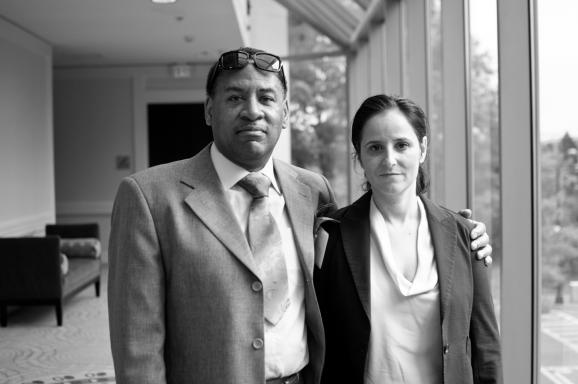The State of Things
By FRANK STASIO AND ALEX GRANADOS
Audio File at http://wunc.org/post/exonerees-share-stories-wrongful-conviction-innocence-network-conference
Across the country, 306 wrongfully convicted inmates have been exonerated because of DNA evidence. The number of people exonerated through other means is hard to calculate, since not all states keep records of exonerees. It might be close to 1,000. But that could be a gross undercount. Over 100 exonerees and many others gathered in Charlotte this past weekend for the 2013 Innocence Network Conference. There, The State of Things host Frank Stasio sat down with two exonerees and two legal professionals to learn more about their stories.
One of the exonerees he spoke to is Bennie Starks. In 1986, Starks was sentenced to 60 years in prison for a crime he did not commit. He wrote to the Innocence Project in the late 1990’s and they agreed to take on his case.
“We got DNA testing in 2000 that excluded him from biological evidence on the victim’s clothing,” said Vanessa Potkin, Innocence Project senior staff attorney, in an interview with Stasio. “And in many jurisdictions around the country that would have been enough to recognize that he was an innocent man. Quite disgracefully, his exoneration didn’t come for 13 years later.”
Starks was finally released in January of this year, after serving 20 years in prison. “It was just difficult to deal with these prosecutors,” Starks said in the interview. “A lot of it was race and politics and it was like ‘hey we don’t’ believe in DNA, this is garbage.’” Starks has received no compensation from the state of Illinois, where he was incarcerated.
Keith Findley, president of the Innocence Network and assistant law professor at the University of Wisconsin, says there may be hundreds of people like Bennie Starks still in prison. Findley recently helped exonerate Audrey Edmunds.
In 1995, Edmunds was at her home babysitting for 7 month-old Natalie Beard, when the child became unresponsive. She immediately called 911, and Natalie was taken to the hospital, but died later that day. Edmunds was charged with first-degree reckless homicide for killing the 7-month-old, whom authorities incorrectly believed died of shaken-baby-syndrome at Edmunds' hand.
“I was devastated. I could not at all figure out why,” Edmunds told Stasio in the interview. She was sentenced to 18 years in prison. Eventually, new scientific research into shaken baby syndrome revealed that the injuries Natalie Beard sustained could not have been caused by Edmunds. She served 11 years of her prison sentence before she was exonerated.
“I never ever expected it to take so long,” Edmunds said. “I probably would’ve jumped off a bridge had I known it was gonna take so long. I had three young children. I was incarcerated two days after my youngest daughter’s first birthday, and that’s really, really hard.”
But for exonerees, getting out of prison is just the first step in the long process of returning to normal life. For Edmunds, finding a job was almost a joke. She had an eleven-year hole in her resume. And even though she’s exonerated, potential employers can still see a criminal conviction on her record.
“It’s just, nearly impossible to overcome the burden that that imposes on a person,” Findley said. Only 27 states have laws that provide for compensation for wrongful convictions.
The goal of the Innocence Network Conference is to bring exonerees together to share their stories and also to identify holes in the legal system that allow wrongful convictions to occur. To learn more about the conference and hear Starks’ and Edmunds’ personal stories, listen to the full interview, above.

No comments:
Post a Comment